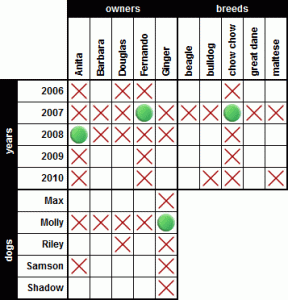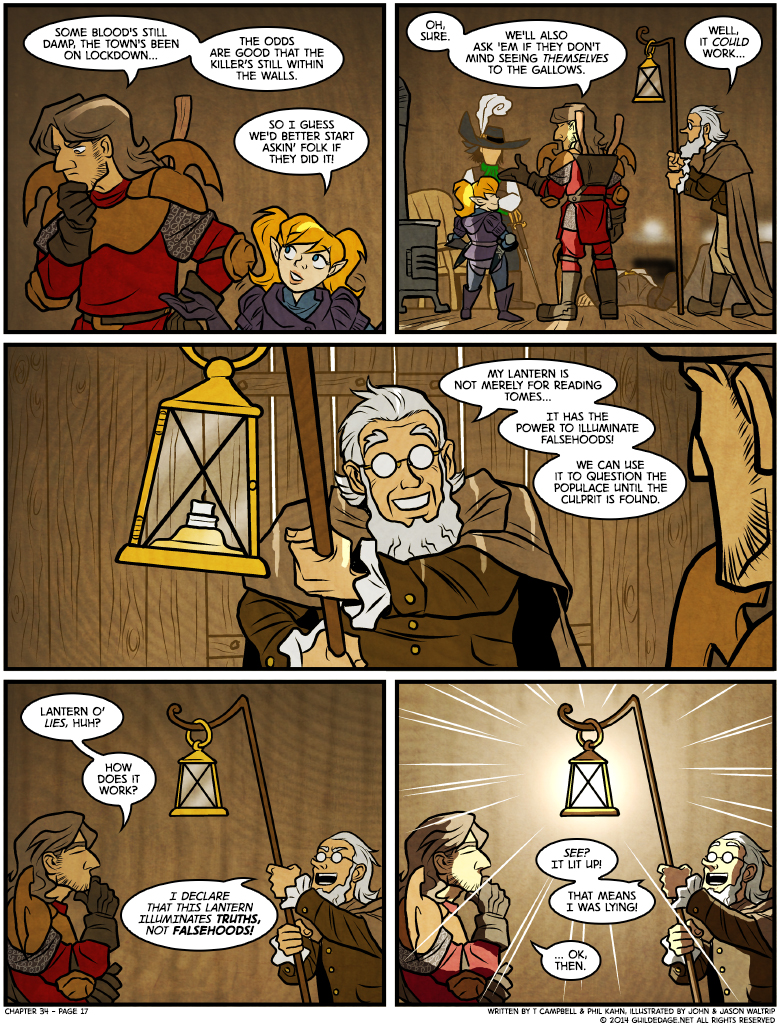Annotated 34-17
 Having declared her intent, Bandit shows a flash of her cutesy side in panels 1 and 2, which breaks the tension pretty effectively, under the circumstances.
Having declared her intent, Bandit shows a flash of her cutesy side in panels 1 and 2, which breaks the tension pretty effectively, under the circumstances.
We didn’t give Lectrus much attention up til now, but he’s currently enjoying a notable, if brief, star turn. The first comment on this page immediately fingered him as the culprit. A reasonable guess, but not right. Not… exactly right, anyway.
Alt text aside, I love logic puzzles. It’s probably best for all concerned that this sequence was firmly Flo’s territory, or these guys would’ve had to work out some six-segment logic grid (the one at right’s only three-segment) and after a few hours of attempting that, the Cultists wouldn’t even need any spells to fill them with madness.











I wonder if people asked Lectrus why he carries around all day a cumbersome lantern that lights up only at seemingly random intervals.
“Okay, we’ve tracked the murderer this far, which means they either went to Sihat Falls or Oginao Falls. And the only remaining witness we haven’t yet interviewed works at the Rhinosaur Reserve…”
Not really related to the current page (though I guess related to later in this arc, whoops) but:
Did the question of “how death works in Kingdoms of Arkerra” ever get answered? There weren’t a lot of people getting revived in-world after dying, but there presumably weren’t too many sepia-world players randomly losing characters from dying (and long-term character interactions and roguelike deaths don’t square all that well), but we also know some of the in-world characters are played by real sepia-world players, at least part of the time, and at least some of them must have died over the series, even before the final showdown. So … What’s up with that?
I remember Bandit died but wasn’t part of the revived by Gravedust group because she respawned. Unfortunately how that was explained i have forgotten
Her player, surprised that “Syr’nj’s player” was bringing up the “we died” thing instead of pretending deaths and respawns don’t happen as most players do, came up with a handwave excuse involving Harky bleeding on her; and Syr’nj, realizing that Bandit was acting weird about being asked to explain having died and come back, was somewhat suspicious but let it go as there was little else she could do.
I’m going to mostly duck this question for now, though it will come up down the line as we show a player contemplating her options after the death of her character. Short, short answer: straight-up resurrection happens a lot less often in Kingdoms than in other games; that’s not never, but as E-Merl says, it’s mostly “when the circumstances are super weird.”
You would imagine such a relic would be hella abused or just plain destroyed by the Heads of the Houses…
…
But you would be wrong. XD
Items like this always present issues: if it reacts to intent, then entirely different stories can both be “true”. Additionally there are things that could be argued to occupy both True and False; while they’re likely more one thing than the other, a polarized item like the lantern is misleading.
If, on the other hand, it responds regardless of personal intent and knowledge, it could be used as a ridiculously good fact-checking and information-gathering device. I’m just going to guess that this is outside the scope of how it works.
The latter possibility reduces the culprit finding to a game of “Guess Who?”
“The murderer is in this room!” … “Okay, we’re good.”
“The murderer wears glasses!” *ding!* *portrait tile flipping*
“All right, now we’re getting somewhere!” *ding!* “Quiet, you.”
Oh waitaminute… “The murderer is NOT in this room.” *ding*
“Oh hell, we’re screwed.”
I don’t think that’s how it works. An untrue statement is only a lie if the speaker knows that it’s untrue.
For the same reason, statements which cannot be decided to be objectively true or false should not be able to trigger the lamp.
Like “I saw a really large bear” is only a lie if you saw no bear at all, because “really large” could mean anything, depending on what size bear the speaker is familiar with, or what they expect the recipient to consider “really large”. For that reason, most things that people say would simply not qualify for a lie check at all.
…which would make the lamp a lot less useful because if it does not light up it that might just mean that what was said was ambiguous in some more or less obvious way, which you may or may not have noticed and/or interpreted correctly or not. That could only be fixed if the lamp also indicated whether some statement was assessed by the lamp or not.
Yeah, if it’s somehow linked to an infallible, omniscient being then he could be doing a lot more useful things with it than investigating murders.
“P is Equal to NP!” *ding!*
“There are Non-Local effects in Physics!” *ding!*
“The real part of every nontrivial zero of the Riemann zeta function is NOT 1/2!” *ding!*